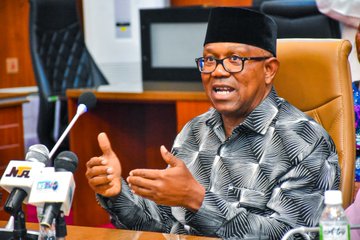
Petrol Subsidy Removal Yields Massive Financial Gains
The Federal Government’s savings jumped by over 500% in the first quarter of 2025 following the removal of petrol subsidies in 2023, according to a recent report by the National Orientation Agency (NOA) .
This surge in revenue marks a major shift in Nigeria’s fiscal policy and has allowed the government to direct billions toward infrastructure, education, agriculture, and debt reduction.
“For decades, oil subsidies were a major burden on our economy,” the report stated.
“But today, we are seeing real progress thanks to President Tinubu’s bold decision.”
A Historic Move That Stopped Billions in Waste
President Bola Ahmed Tinubu ended the long-standing fuel subsidy regime shortly after taking office in 2023. The move stopped years of economic bleeding that had cost Nigeria over $84 billion between 2005 and 2022.
Before the reform, fuel subsidies consumed more than 70% of potential federal revenue , forcing both federal and state governments into unsustainable debt cycles.
“The subsidy budget hit N4 trillion in 2022—the highest ever recorded,” the NOA report noted.
Now, with the subsidy gone, the government saved ₦836 billion in just one quarter—up from only ₦154 billion in previous periods.
States Benefit as FAAC Allocations Triple
One of the biggest wins from the subsidy removal was the massive increase in FAAC allocations . In 2024 alone, states received ₦15.26 trillion , up from ₦6.16 trillion in 2023 .
This means:
- Regular salary payments for workers
- Reduced borrowing and debt levels
- More funding for local development projects
According to NOA, many states that once struggled to pay salaries now have enough funds to cover expenses—even after the recent minimum wage hike .
“States are swimming in inflows of money,” the report said.
“They’re paying salaries on time and reducing debts.”
Between June 2023 and December 2024, subnational governments repaid ₦1.85 trillion in domestic debt , showing real financial recovery.
Investing in Infrastructure, Education, and Growth
The report highlighted how the government used the savings to fund major national priorities:
- ₦20 trillion allocated for infrastructure development
- ₦54 billion released under the National Education Loan Fund (NELFUND)
- ₦1.5 trillion invested in agriculture
- ₦1 trillion directed toward solid minerals development
- Launch of the CNG transport conversion program to cut fuel costs
These investments show a clear shift from wasteful spending to capital development —something Nigeria desperately needed.
In fact, the 2025 Appropriation Act marked the first time in decades that capital expenditure surpassed recurrent spending , with capital allocation reaching ₦23.96 trillion versus ₦13.64 trillion for recurrent needs.
From Crisis to Recovery: How the Economy Turned Around
At the start of Tinubu’s administration, Nigeria faced a dire financial situation. The country spent 97% of its revenues on debt servicing , and total debt exceeded ₦100 trillion .
Fuel subsidy removal helped stop the slide.
“Subsidy removal saved the economy from imminent collapse,” the report concluded.
It also freed up resources to tackle other pressing issues like road construction and power sector reforms.
To date, the government has funded 40 major road projects across the country since 2023, signaling a return to growth-focused governance.
The Pain Was Worth It — Says NOA
While the initial phase of subsidy removal caused public discomfort, the NOA likened it to “a woman in labor” —a painful but necessary process leading to long-term benefits.
“Nigerians are already reaping the gains,” the agency affirmed.
The report urged citizens to focus on the broader transformation happening in the economy and not just on short-term challenges.
Call to Action: Share Your Thoughts!
What do you think about the impact of the petrol subsidy removal ? Are you seeing improvements in your state?
💬 Leave a comment below and join the conversation on Nigeria’s economic reforms.
📢 Don’t forget to share this article to spread awareness about how subsidy removal is reshaping Nigeria’s finances.
🤝 Want to stay updated on national policies and economic changes? Follow us or sign up for our newsletter.
















Be the first to leave a comment